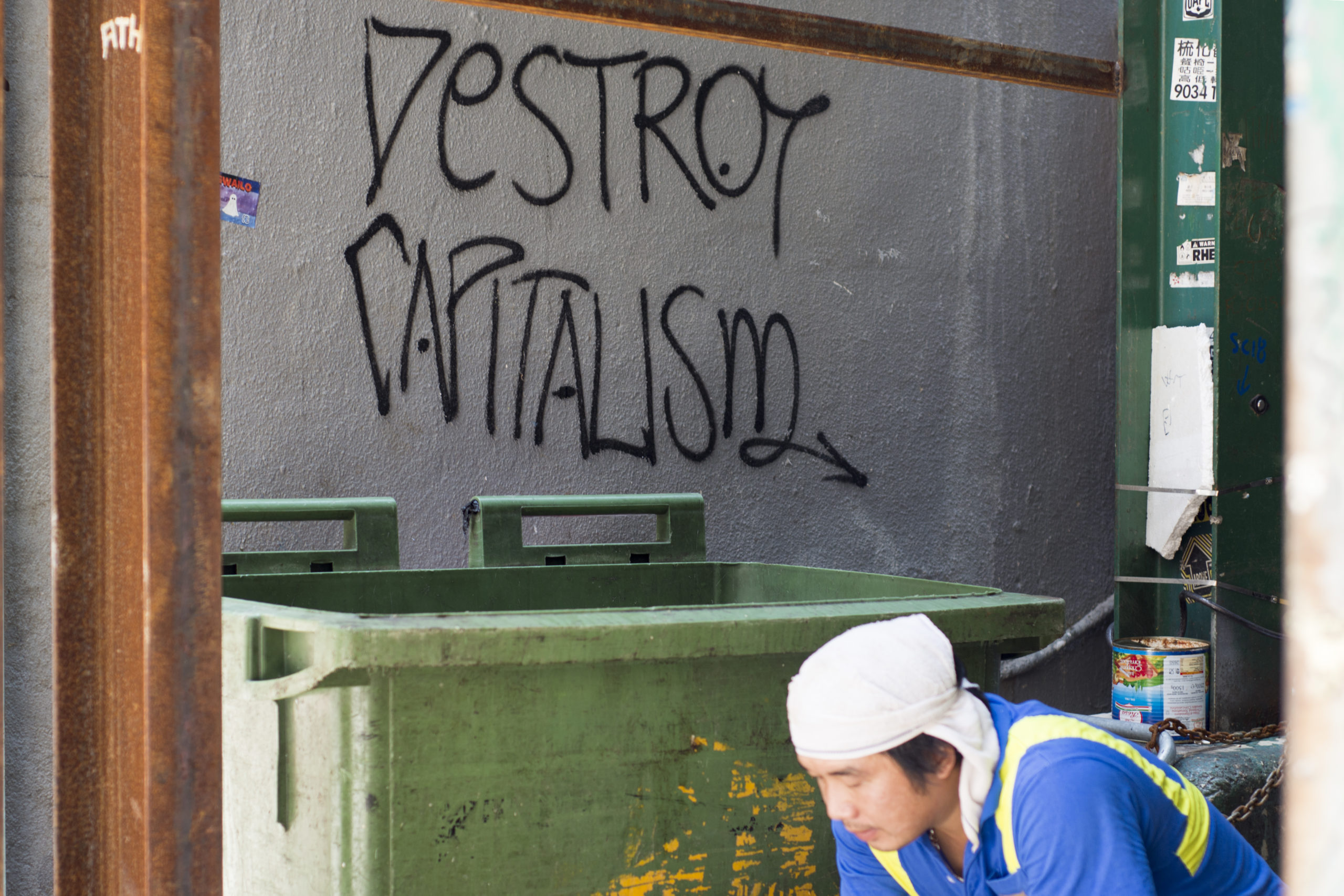Original: 【路見不平,挺身而出──抗命時代的清潔工人】, published in HKCTU (Hong Kong Confederation of Trade Unions)
Translator: Chin Kinnan
On August 5, 2019, when the Anti-Extradition protests reached a fever pitch, Hong Kong activists called for what was then an unprecedented general strike. Rallies were held in seven electoral districts, and protesters started blocking the streets around noon of their own accord. By night, the blockades triggered clashes between the police and protesters. According to media reports, when protesters gathered near the Cheung Sha Wan Government Offices, a lone, slipper-clad local from nearby Sham Shui Po stood in front of the police with outstretched arms and yelled in warning, “Get out of here!” He was later arrested on charges of “obstructing a police officer.” His name is Ah Long, and he works as a nighttime janitor.
‘Is there a place in society for people like them?’
Ah Long started doing janitorial work in 1989. He first cleaned glass, then took jobs on suspended platforms, waxing floors, and supervising projects. He remembers how in the 90’s, it was “easy money”: the daily wage for work on suspended platforms was as much as HK$1,200-1,300 (US$155-168), but now it has shrunk to HK$800-1,000 (US$103-129), sometimes going as low as HK$650 (US$84). While the cost of living has doubled, salaries have dropped by a third. Having been in the industry for thirty years, he has seen outsourcing become more prevalent along other kinds of exploitative tactics. “The scammers got more and more sophisticated. For example, a company may be a front to another company, pocketing money under the table and taking advantage of honest people.”
In recent months, due to unjust police practices, rumors of vigilante justice started to appear. Ah Long joked that there was once a “snake-head” (middleman) who had skipped out on owed wages. The person in question would’ve then fled to mainland China. In cases like this, reporting it to the Labor Department would be a waste of time, and the police just as pointless. Having been in the industry for so long, Ah Long has built up his own network, so he’d rather rely on posting the incident on Facebook, and use “private means” to settle the payment. That said, resolving the issue under “street” rules still means that there are lines you don’t cross. For example, even though you know where the snake-head lives, everyone agrees that “family is off-limits.”
The apartments get smaller and smaller, yet more and more expensive.
Ah Long isn’t shy to talk about how when he was young, he knew some shady people. But as he got older, he came to prefer a quieter life and hung out with small animals. Holed-up in a 120 sq. ft. unit in an old traditional building, he now has a hedgehog and two grooved tortoises as “roommates.” Ah Long recalls how for thirty years he’s always rented in old-style buildings. He’s lived on 88 Staunton St. in Central, moved to Quarry Bay, then again ten years ago to Sham Shui Po, each apartment smaller yet each more expensive than the previous. Seven years ago, the rent of his current unit was HK$2,500 (US$323). Today it has increased to HK$5,200 (US$671).
On August 9, 2019, Chief Executive Carrie Lam addressed the media, criticizing that the protesters “have no stake in [Hong Kong] society which so many people have helped to build… causing huge damage to the economy and to the daily life of the people.” Now that Ah Long has been arrested, he falls neatly under what Lam had labeled “stake-less” people. Of course such claims are absurd. Janitorial workers contribute both to society and the economy. And while Ah Long wouldn’t be considered to be in the lowest rung among janitorial workers, he certainly has not reaped the benefits of Hong Kong’s economy. From the 90’s onward, there has indeed been great economic prosperity. But for whom?
‘This time, it’s everyone’s business’
When discussing political participation, Ah Long would bring up the Tiananmen Massacre: “Even at that time, I felt like the students were the future.” After the handover in 1997, Hong Kong underwent rapid changes. Besides going to June 4 and July 1 events, he also participated in the Umbrella Movement. “I may not come out for regular rallies, but if I see troublemakers attacking protesters or beating up regular folks and young people, I would definitely stand up for them.” He recalls how during the Umbrella Movement there were also triad members attacking protesters, and even though the police didn’t push back on them completely, the violence didn’t get too out of hand. Compared to 2014, the Hong Kong police has become completely out of control.
On the topic of police brutality, Ah Long would get a little worked up. “Why do they need to hit people’s heads? Why do they need to fire at close range? That could be fatal! So many people were already crowded on the escalators, why do they still need to chase them down on it?” In the face of an indifferent government and an unscrupulous police force, the violence of the protesters gradually escalated. Although the government consistently chastises the protesters as rioters, Ah Long feels that “if the protesters were really rioters, then a lot of police officers would be dead by now!”
There has indeed been great economic prosperity. But for whom?
After roughly 100 days of protest, the number of injured protesters felt uncountable. Casualties had broken bones, fractured skulls, punctured eyes, among other injuries. In contrast, there were hardly any incidents of police injury. The underlying reason, besides the disparity in training and protective equipment, is that the law shields the police. “Against triads, you can still fight back. When it comes to the police, attacking them could result in serious legal ramifications, but when the police hits you back, they would be upholding the law. So what can you do?”
Ah Long’s perspective is in the minority within his industry. Many people he’s known for years have a mentality that “as long as it doesn’t affect my paycheck,” even if they feel like there are problems in society, they would not voice any objections. “There are things people need to do. Have you listened closely to what the kids have to say? Have you protected them? If you think that politics doesn’t affect you, have you considered if it was your kid they injured?” Ah Long hopes that for those friends who are usually not politically involved, they can begin with some small steps: “Don’t go to work for a few days, skip a few meals… are you going to die? No, you won’t. This time, it’s everyone’s business in Hong Kong.”
‘If we stand united, we can persevere’
Good times don’t last forever, but when it rains it pours. A few days after Ah Long got arrested, his father passed away. Thanks to the help he got from the 612 Humanitarian Relief Fund, costs for funeral arrangements were taken care of. Before getting arrested, Ah Long had two nighttime cleaning jobs, cleaning and waxing floors at shopping centers in Tsuen Wan. The income was okay, and the work was relatively flexible. Not long after being arrested, the court issued a curfew order, so nighttime work could no longer continue. Thankfully, Ah Long was able to find new work.
As for the future, Ah Long has no idea how the movement will develop, but what he’s certain of is “if we stand united, we can persevere, and if we are divided, we’ll lose for sure.” As a final word of caution to the protesters, he says: “Don’t let them catch up with you and get you on your own, because nowadays the police is just as dangerous as the triads.”
Epilogue
On October 2nd, Ah Long was arraigned at the Kowloon City Magistrates’ Courts. The prosecution modified their charges, from the “obstructing a police officer” charge under the Summary Offenses Ordinance, to the same charge but under the Offenses Against the Person Ordinance instead. The maximum term of imprisonment thus rose from six months to two years. While there is still the rule of law, the legal system has always given those wielding that power a lot of leeway. Even if the government is overtly more lenient to those who are pro-government, and more severe towards protestors, your average citizen can’t say or do much. On top of that, at the second court hearing, the prosecution was still unable to provide to the defense witness testimonies, drawing rebuke even from the judge. At lunch after the hearing, Ah Long’s sister asked me, “Why didn’t they prepare their paperwork before filing their charges? So what’s been going on during the curfew order?” I thought this would be common knowledge by now, but the antics of today’s government have long surpassed what’s considered commonplace.






